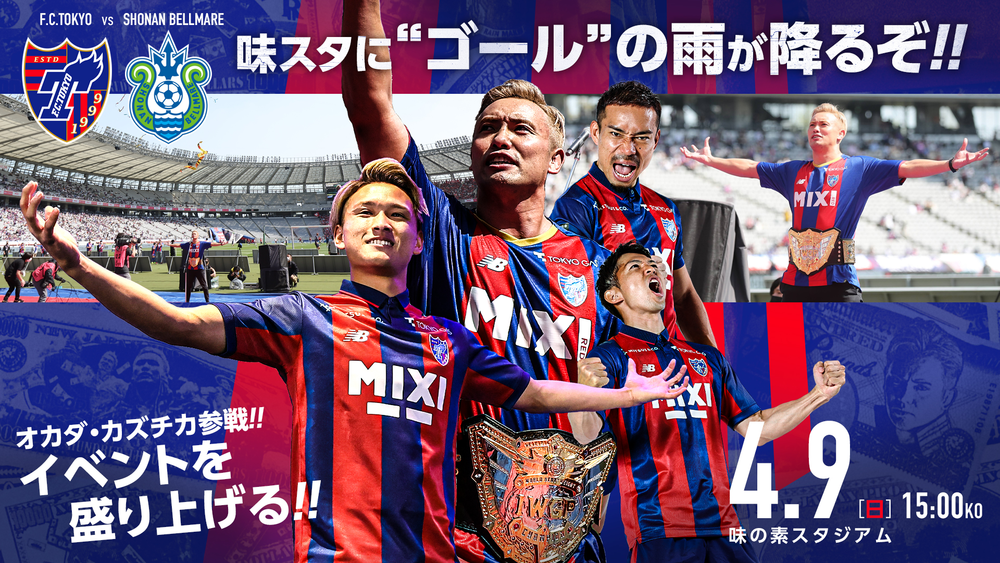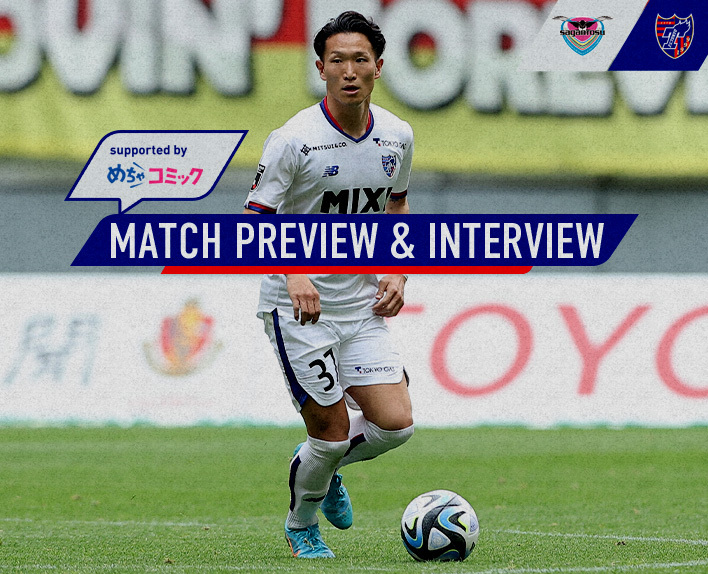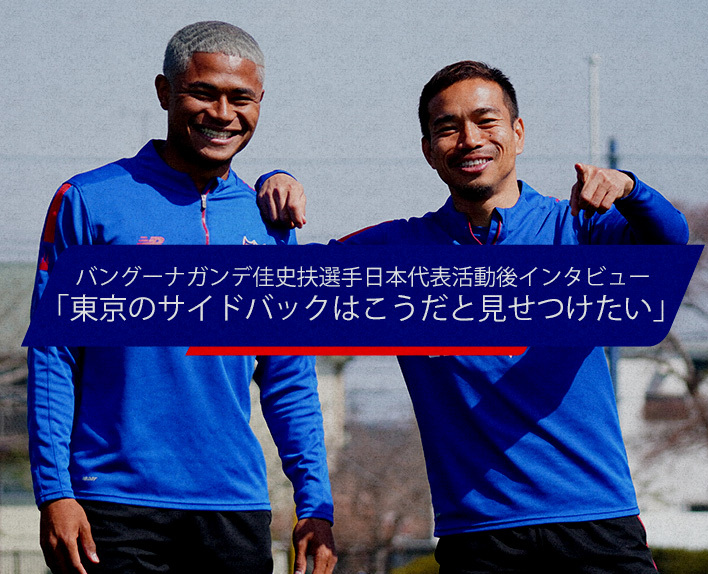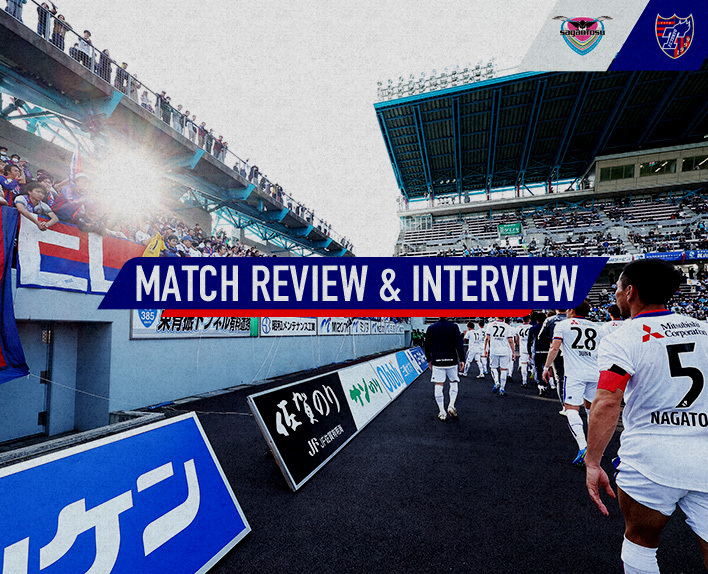Previous Match: Nagoya Match Review
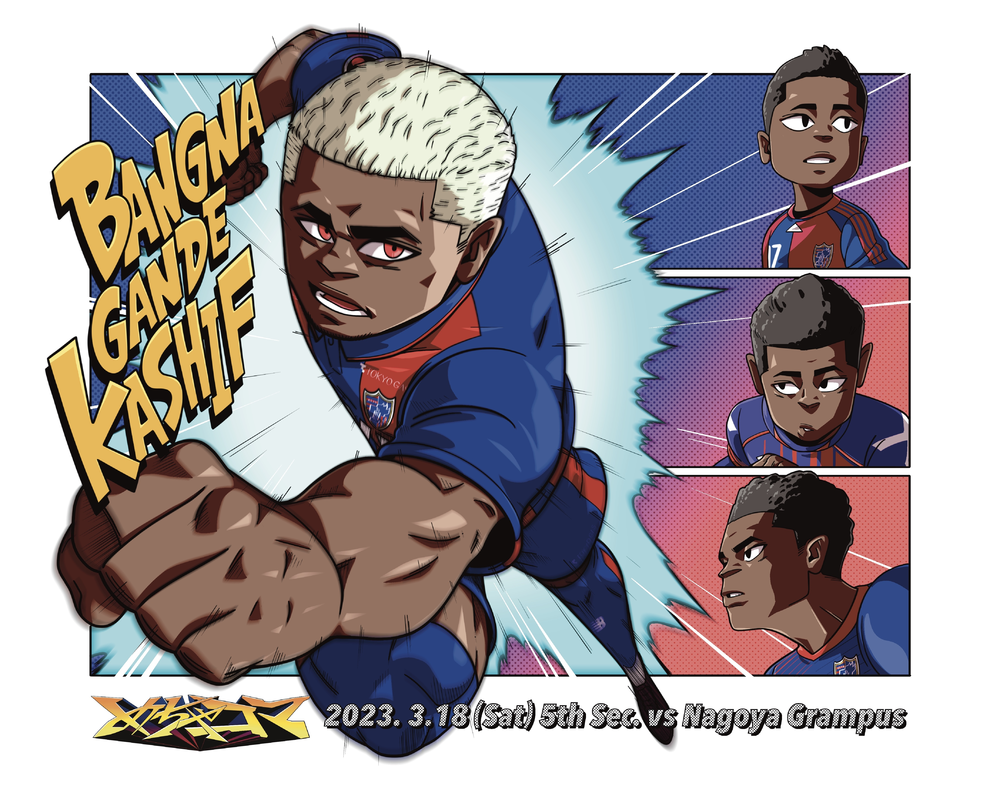
A match against Nagoya Grampus, managed by Kenta HASEGAWA, who brought a title to Tokyo. Although the score did not change, it was a "tactical match" (managed by Albert PUIG ORTONEDA) where both sides were cautious of each other's strong points, and Kashif BANGNAGANDE, who was just selected for the Japan national team, was active.
In a mirror game where both teams adopted a three-back formation to guard against the opponent's fierce counterattacks, it may have seemed like a stalemate with few scenes in front of the goal. However, in each situation, there was a fierce determination to exploit even the slightest positional discrepancies and a sharp tactical mindset aimed at maximizing their own attacking strengths by seizing any moment of weakness.
Tokyo gathers the ball to the left side with Kashif BANGNAGANDE, probing for a path to goal through attacks from the side, while Nagoya launches a fierce counterattack with their three forwards, exploiting the space behind the advancing Tokyo players.
Tokyo managed to deliver crosses, but could not break through Nagoya's solid defense in front of the goal. On the other hand, against Nagoya's counterattacks, Jakub SLOWIK made fine saves while the wing-backs quickly pressed back to delay the counter and reduce the accuracy of the scoring opportunities.
This season, although there were challenges in terms of results for Yoshifumi, who has rapidly grown and reached the Japan national team, it was a match that showcased his extraordinary talent in the offensive and defensive play on the side, leaving a strong impression of a "new star on the blue-red left side."
<Preview>
It goes without saying that the recent match record is here, and regardless of home or away, it is clear that Sagan Tosu is a formidable opponent for Tokyo.
This season, as Kei KOIZUMI, who joined from Tosu, has mentioned multiple times, the styles of Tokyo and Tosu are very similar. They thoroughly maintain possession of the ball, deliver decisive passes without being hindered by narrow spaces, and score goals. It is a style of play that emphasizes offense over defense.
This season, the team has struggled with a record of 1 win, 1 draw, and 3 losses, placing them 15th. However, in the second season under head coach Kenta KAWAI, there is an impression that the tactics and organizational maturity have improved.
If the match has a similar style, the difference will come down to the maturity of the organization and tactics, or the difference in individual tactics.
In the former case, Coach Albert PUIG ORTONEDA is working on deepening tactics in his second season in charge, aiming for the maturity of an organization capable of diverse attacking patterns and game development. The situation is similar for Coach Kawai in his second season with Tosu, and the key will be which team takes control of the ball and the game. In some cases, the strategy of allowing the opponent to "hold the ball" may also influence the outcome of the match.
In the latter case, Tokyo should have an advantage in terms of talent. They have a well-balanced roster of veterans, mid-career players, and young talents, along with foreign players who possess strong personalities. However, considering last season's away game where they were overwhelmed by the intensity on the ball side and lost momentum, individual abilities and tactics, along with intensity, will likely be factors that influence the outcome of the match.
The key player here is Koizumi, who possesses exceptional strength in duels. Koizumi believes in playing with a mindset of calculating backwards from victory, and considers winning in duels to be essential. Can he surpass the opponent's strength in midfield and tactically leverage his deep understanding of his former team's style to create a favorable situation? We hope for a great performance from Koizumi.
[Interview with Coach Albert PUIG ORTONEDA] 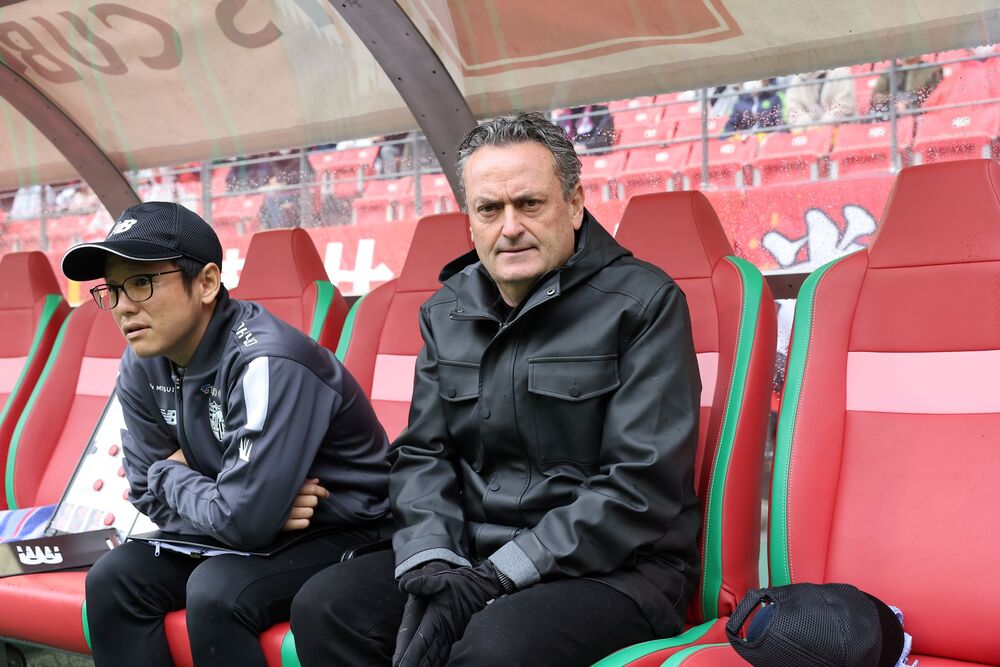
Q, Kashif BANGNAGANDE recorded his first cap for the Japan national team, did you see it?
A, I think they played well. They were calm, and especially in attack, I believe they were able to take good positions and play effectively. I think they performed well enough to be evaluated positively for the Japan national team's first match.
Q: After finishing 5 league matches, we have 2 wins, 2 draws, and 1 loss.
A, I think we were able to start this season with a clear step forward. However, I did not expect multiple players to be sidelined. Matsuki's call-up to the U-20 Japan national team, along with injuries, caused the entire team to struggle. As a result, we were unable to maintain continuity within the team. The season is long, and such situations can occur for any team. Right now, we are in a difficult situation, so we must overcome it firmly. In this challenging team situation, I want to accumulate as many points as possible and maintain our position at the top. The season has just begun, and I believe our current ranking is not bad at all. However, with players in the same position absent at the same time, I think we need to overcome this together as a team.
Q: We couldn't win against Tosu even once last season, and it was a tough match away.
A, last season we struggled in matches against Tosu and Shonan. However, when the season ended, we finished above them in the standings. We faced them when they were playing well, and they outperformed us with good soccer. There were times last season when we were dominated in midfield by our opponents. We certainly did not have good matches against Tosu either. Tosu is a dangerous team that plays well when we give up the ball. In tomorrow's match, I want us to stay focused and aim for victory by controlling the game.
Q: Tosu is on a seven-game losing streak in the league.
A, I think that is an interesting number. However, that number can also be seen as evidence that Tosu's management scale is not necessarily large, yet they continue to demonstrate excellent performance. Therefore, I believe it is one of the clubs worth respecting. However, what is important in the football world is the ranking at the end of the season in a long league.
Q, I think Matsuki had a significant presence in the Levain Cup.
A, I don't think there's a need to comment on my evaluation of him at this point. At the same time, I believe everyone knows that he is a wonderful player.
Q: There is a possibility that Matsuki will be absent from the Japan national team activities in May.
A, Kumada is likely to be called up as well. We can see our players being called up to the Japan national team as one of our successes.
Q: Won't Matsuki's absence affect the support movements in the attacking third?
A, Matsuki and Abe are both very active and can sprint to apply pressure multiple times. At the same time, their play with the ball has improved since last season. When these two are absent, we must approach the match by effectively utilizing players with different characteristics. Naturally, there is a clear style regardless of the players' characteristics. However, in each match, we must consider these characteristics when approaching the game. When Matsuki and Abe are present, we can apply pressure with their abundant activity and also make attacking runs. If those two are not available, it is my job as the coach to find alternative solutions and strategies.
[Player Interview]
<KeiKOIZUMI Player> 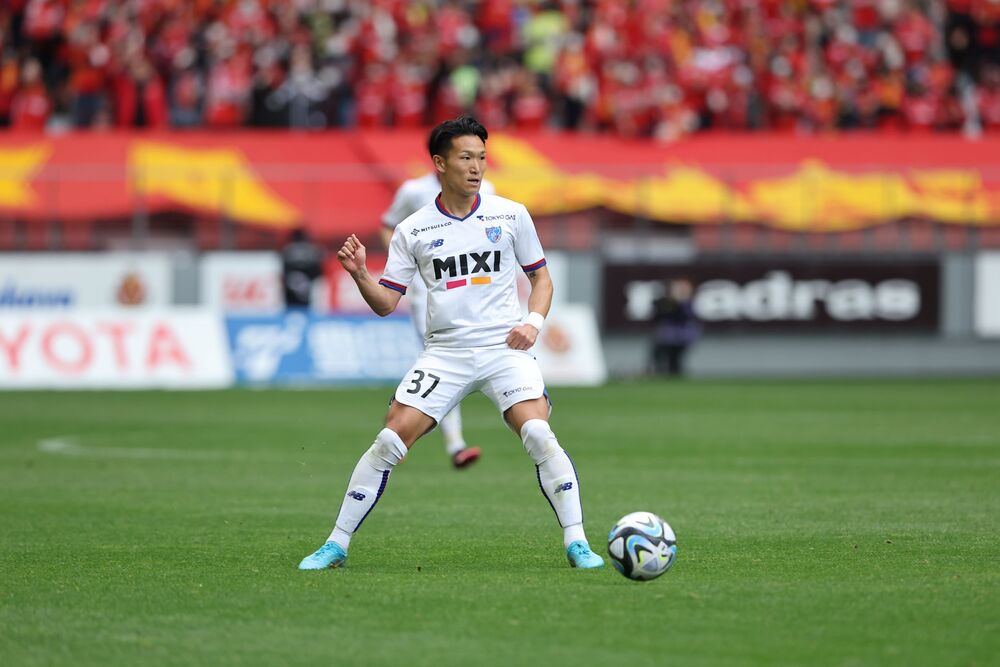
Q: How do you feel about the match against your former club, Sagan Tosu?
A, I am really looking forward to it. I spent one and a half seasons in Tosu, and I can only express my gratitude. I hope to play with a strong sense of appreciation. No matter who the opponent is, I am now a part of Tokyo, so I want to do what I can for Tokyo.
Q: Do you have any feelings about facing Tosu as an opponent?
A, I am looking forward to playing against players I have played with before. I can predict what kind of football they will bring. I know the strengths and weaknesses of each individual player. While I am excited, I absolutely do not want to lose, and right now, I am only thinking about winning in Tokyo.
Q: What is important to focus on in order to move up from here?
During the season, there are injuries and various situations. Whether it's better to connect all the balls or to play simply depends on the opponent, and there will definitely be good times and bad times. However, I believe that as long as we do not lose in terms of intensity while playing as a base in Tokyo, we won't have a major collapse. First, we need to fight firmly in the foundational aspects, and I hope we can turn what we practice in training into a positive. If we can play with confidence like in the Levain Cup match against Kyoto and continuously challenge ourselves in ball possession, I believe we will undoubtedly improve.
Q: How was your time in Tosu for a season and a half?
Although it may have been a short period of just one and a half seasons, I believe this club helped me grow tremendously as a football player. As a player, I was able to learn a way of thinking that I had never experienced before through training and matches. It was a team that was very particular about build-up play, so there were many challenges for me, and when I first joined, I was confused about how far the passing would go. Moving from Kashima to Tosu, a team with a different style, I was initially unsettled and couldn’t fully demonstrate my abilities. After working through the camp and spending a year with Tosu’s coach Kenta KAWAI, I learned a lot about build-up, positioning, and more about offense than defense. I was able to rediscover the joy of football, and many younger and older players at Tosu treated me very well. I am deeply grateful despite the short period of one and a half seasons, and I hope to express that gratitude through my play.
Q: How do you want to show what you learned in Tosu during the match?
A, now that I am part of Tokyo, I believe that once I step onto the pitch, that doesn't matter. The stadium in Tosu is a place that holds a lot of memories for me, and by playing my best there, I hope to express that I am working hard here now. It is difficult to show my gratitude through my play, but I think it is important to compete with respect. Of course, since I have transferred, I don't know how I will be perceived. From the perspective of Tosu fans and supporters, I was only there for a season and a half before transferring, so some may think well of me, while others may not. Including all of that, I only have respect for Tosu, and I hope to carry that feeling with me as I perform well.
Q: How was it for the three players of the same age, Shuhei TOKUMOTO, Junya SUZUKI, and Koizumi, to play together in the Levain Cup?
During camp and before the Levain Cup matches, we talked about the possibility of the three of us playing together someday. I was really happy that we could stand on the pitch together. The presence of the two is undoubtedly significant, and they have been a great help both on and off the pitch. They seem much more mature than their age. Tokyo has many young players, and I think the three of us are just at the right age to be considered mid-level players. We discussed that mid-level players need to be more vocal when we went out to eat. I hope to be more conscious of that and speak up.
Q: I think the characters have distinct personalities and are well-balanced. What do you think?
I think both of them are very mature. I’m not sure about Tokumoto, but I believe he has a mental age that doesn’t seem to match his peers.
Q: With the image of young players rising, and the veterans being energetic, I think it would be even more exciting if the middle layer is also active. What do you think?
A, the three of us, as well as Ryoma WATANABE, Shuto ABE, and Hotaka NAKAMURA, are in the same situation. I believe that by achieving results during practice and in matches, both those above and below us will feel the need to work harder. I feel that our generation of mid-career players must do our best.
Q: How do you feel about Suzuki's presence and attitude towards practice?
In a world where only 18 players can be included in the squad, there is a complex situation where, no matter how hard everyone works, not everyone is given a chance. But that is the reality. Even if Suzuki is not able to participate in the matches, by seeing him vocal during practice and working hard in one-on-one situations, I believe that players who are on the field will feel that if those who are not playing are doing this much, they need to do even more. I think I have to carry the feelings of those players who cannot play when I am on the field. Of course, there have been times when I was not included on the bench, but I have learned the importance of working hard without getting too emotional, regardless of whether I play or not. Players who are on the field undoubtedly have to fight while carrying the feelings of those players, so I hope to do my best.
Q, is showing your culmination your mission in Tokyo?
I have really had a variety of experiences. This is my 10th year, so being able to play for various teams has been a significant experience. I came here thinking that if I want to win a title, it has to be in Tokyo. I hope to utilize my past experiences for the team, and I believe I need to demonstrate them. Ultimately, no matter how good the soccer is, I think we need to win, so I want to focus on playing for victory.
Q: I believe Tokyo is also in a process of change, so please share your enthusiasm for this season.
A, I think this is a time when we are joining from this season and Tokyo itself is also taking on challenges. I want to work hard together in that regard, and I believe everyone's goal is to win titles. This season, I want to challenge together towards that goal. As long as I am on the field, I must continue to deliver results; otherwise, I won't be able to stay on the field. In that sense, I think we need to focus not only on the result of victory but also on visible numbers. Above all, the most important thing is to play to ensure Tokyo wins.
<Koki TSUKAGAWA> 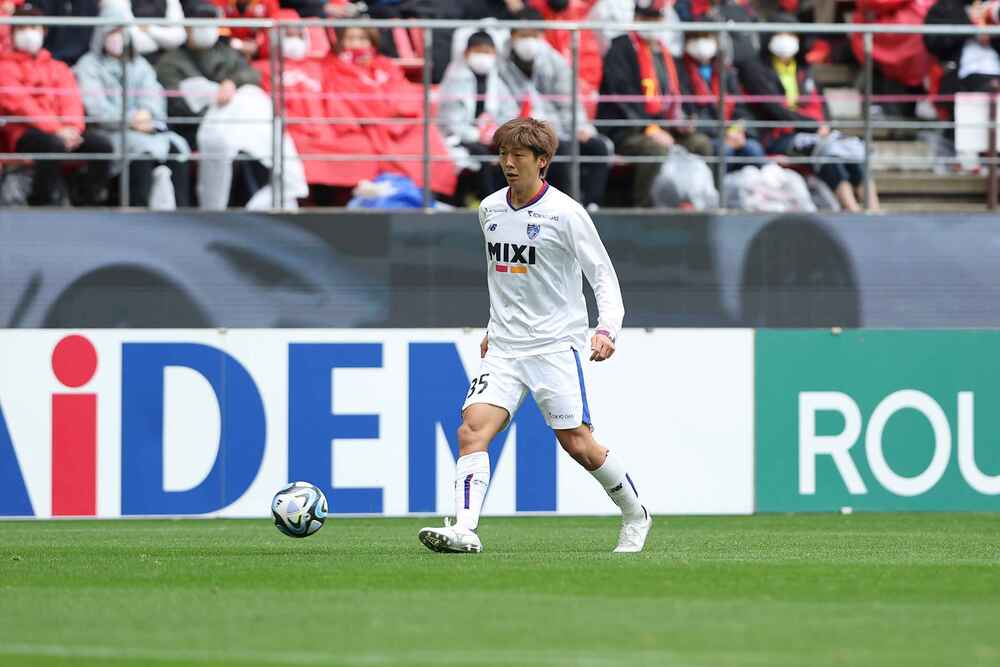
Q: In the difficult situation where the number of injured players is increasing, what kind of play do you want to focus on?
A, I have been saying this all along, but I am committed to contributing to the team's victory while making plays that lead to scoring.
Q: What preparations did you make for the match against Tosu?
As the coach has said, I think it would be great if we can showcase our strengths. Last season ended in a disappointing result, so we have prepared to overcome that and want to express it through our play. I believe this is also one of Tosu's strengths, but first, I want to prioritize not losing in one-on-one situations. Additionally, I think it will be important to figure out how we can convert our plays in front of the goal into scoring opportunities. After regaining possession of the ball, I hope we can make decisions as a team on whether to maintain possession carefully or to launch a quick counterattack.
Q: Do you want to showcase your strengths in the attacking third?
A, as you said, I think what we can do after entering the attacking third is important. I hope we can better showcase our final ideas and the ability to change our decisions based on the opponent during the match. I want to make sure we can connect this to results in the match against Tosu.
Q: I think it's important to hold on here, especially with injuries coming up.
I believe that a strong team can fill the gaps even with injured or absent players. I want to show this through results. There are players who are absent, but I think everyone sees this as an opportunity, and I hope we can achieve solid results to create a positive cycle for the team.
Q: Is it necessary to leave an impact?
I believe it is important to consistently showcase my strengths. The match against Tosu will also be very important. I want to seek results in every single match.
Q: I think there were appearances in positions that are not your main position. It seems that the boldness is not yet visible compared to last season, what do you think?
There are parts that I can't help but think about. I believe that is due to my lack of skill. In order to grow on a larger scale, I need to tackle challenges more through practice. Even within myself, I can't say that I was in great form during the Kyoto match, and I think the only way to resolve this is by achieving results in matches.
Q: Are you struggling with physicality or fitting into the team?
I would say I'm struggling, but the team is taking on new challenges. Last season, we focused on connecting the ball together, and we were able to do that, but this season, we have various options, such as being able to connect the ball and also execute quick attacks. It will be necessary for the entire team to align on what decisions to make in different situations. I want to play while considering my position so that I can connect things well. However, there are parts where I overthink it and my scale becomes smaller, which prevents me from showcasing my strengths. If I can play while considering the balance well, I believe I can grow more and the team will improve as well.
Q: Tokyo has been unable to win against Tosu.
I want to win here to change the flow, and I want to play in a way that thoroughly dispels my sense of discomfort.
